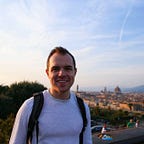Hi, I’m Chris and I am Learning Data Science.
When I think of the ideal job in life, I think of one that demands critical thinking…where solving problems is an every day’s challenge; where practicing mathematics is foundational to your immediate success; and where you get to “do it all” using code! I’m Christopher Kuzemka and I am learning data science.
I’m a graduate from Hofstra University’s Fred DeMatties School of Engineering with a Bachelor of Science in Mechanical Engineering and a minor in Mathematics. I’m a certified E.I.T. with the state of New York and I enjoy programming. I first went to college to study Civil Engineering, but I switched over to the Biomedical curriculum and took up a second major in Mathematics. This was my college career for a while until I attended a career fair where I learned — crushingly — that I didn’t know what I was doing with my life. Biomed was a new and sparse field at the time and theoretical mathematics was extremely difficult (I have a lot of respect for mathematicians. They satisfyingly destroyed the overbearing egos of my obnoxious engineering peers). It was at this point where I decided it was important to specialize and make a full commitment to Mechanical Engineering.
Mechanical Engineering is great. It heavily focuses on the analysis of dynamic systems and the typical uses of applied mathematics. I found that automation & thermodynamics are also some of the most interesting topics in the curriculum. My interests left me optimistic for industry. I spent a few months working in aerospace for a Co-op and then in construction full-time, but ultimately discovered that the work I did lacked some purpose and soul. I saw that my field was saturated with positions focused with either CAD or Project Management (drawing 3D models or organizing paperwork). I was not in any fortunate position to readily use what I learned in a textbook on a daily basis and worried that my time spent in industry would numb my sharpness and skills in subjects that first turned me onto the degree.
It was late into my college career where I began to realize that I loved to program. Most of my homework towards the end of my last few semesters were submitted in MATLAB and LaTeX. I was fascinated by the inner workings of languages and computers. I did not realize until recently that data science was a part of what I did on a daily basis. Every Friday in my junior year, I would work on interpreting Fluid Mechanics and Engineering Materials lab data until 11:30pm….and I enjoyed doing that. However, I couldn’t just make such a pivot to tech in college at that point. It would’ve been financial suicide.
I want to bridge the gap between programming and mechanical engineering. None of this would exist without some inert passion for mathematics. While I struggle to understand the various fundamental proofs and theories of Cauchy or Riemann, my exposure to theory helped me understand some foundation to differential equations and control systems. Pivoting to data science through a boot camp, to me, is the necessary leap of faith (financially and personally) towards bridging that gap. I hope to establish a solid data science foundation to explore innovative ways to bring a new outlook to engineering. With such aspirations, I see myself as someone who may find satisfaction in research and development (though the PhD time commitment would be emotionally taxing). I see myself as someone who may find satisfaction in combining machine learning with automation and bringing new technology to manufacturing. I can see myself enjoying some company-wide analysis and consulting for an industry to help stakeholders understand what would be the best direction for investments or to help stakeholders understand how efficient their company is operating. I also see a future where I may consider teaching in academia to help inspire STEM students to have a stronger passion for mathematics, using data science as tool for doing so.
The possibilities seem endless, though a focus will be required at some point. Until then, I am keeping myself open to opportunity and feel that data science mixed with relative field mathematics gives the ability for an individual to be versatile wherever they go. I urge individuals that may feel the same way to consider data science as a learning opportunity. An unimaginable quantity (~2.5 quintillion bytes of data created per day….a rate that will surpass the number of stars found in the observable universe) of data is created every day and industry NEEDS passionate critical thinkers to analyze it and see what it’s saying!
Sources and Related Links:
